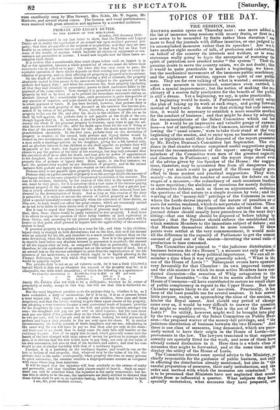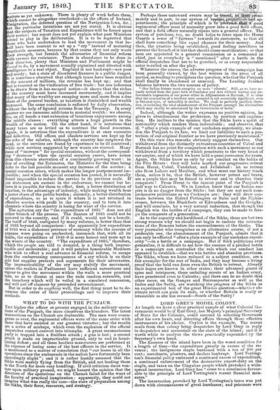TOPICS OF THE DAY.
THE SESSION, 1849. ANOTHER session opens on Thursday next : one more added to the list of immense long sessions with scanty fruits, or first in a new series to be measured by fruits rather than duration ? one more to flood the journals with diffuse inanities, or one judged by its accomplished measures rather than its speeches I Are we ta have another eight months of talk, of profession and exhortation on behalf of the country its interests and welfare, or is some statesman really going to begin the enterprise of restoring the spirit of patriotism now crushed under " the system"? That the genuine desire to serve the country exists, we do not doubt; that it would be quite practicable to make a beginning, we know, but the mechanical movements of the immense public machinery, and the nightmare of routine, oppress the spirit of our public men. They are for ever talking of what is wanted ; occasionally some rare measure is introduced, sometimes even earned, to effect a special improvement ; but the notion of making the ma. chinery of a session fully productive for the benefit of the public is still a dream. Yet a beginning, we say, is quite practicable.
A beginning would be made, if Parliament would only adopt
the plan of taking up its work at each stage, and going forward instead of backward. In order to that striking but safe innova- tion, it would be necessary to establish a more sensible method for the conduct of business ; and that might be done by adopting the recommendations of the Select Committee which sat last year. It would be an impressive and valuable gauge of earnest. ness—a test of intelligence—if the Commons, instead of idly fol. lowing the "usual course," were to take their stand at the very beginning of the session, and to enter upon no business of discus- sion or legislation until they had disposed of the report presented by Mr. Evelyn Denison's Committee last September. The evi- dence in that slender volume comprised useful suggestions going beyond the recommendations of the report : among the leading members of the Committee were men of the greatest sagacity and discretion in Parliament ; and the report stops short even of the advice given by the Speaker of the House : the sugges. tions, therefore, may be accounted free from all dangerous ten. dency ; yet much would be gained if the House simply gave effect to those modest and practical suggestions. They were, mainly—to diminish the number of occasions for debate on the stages of a measure —the redundancy of such occasions leading to mere repetition ; the abolition of occasions for merely fictitious or obstructive debates, such as those on adjournment, reducing the questions of that nature to a simple decision by vote; and the waiving of the "money-bill" privilege of the Commons in cases where the Lords decree imposts of the nature of penalties or of costs for service rendered, which do not partake of taxation. These were to be fixed rules : the Committee also advised that an ad. journed debate should usually have precedence in the next day's sitting—that one one thing should be disposed of before taking up another ; that the Speaker should enforce the established rule which restricts Members to the immediate subject of debate ; and that Members themselves should be more concise. If these points were settled at the very commencement, it would make all the difference in the capacity of Parliament to get the utmost amount of good out of the session—inverting the usual ratio of production to time consumed.
The Committee also pointed to "the judicious distribution of business between the two Houses "; a measure not only of work- ing convenience, but of deep political importance. We can all re- member a time when it was very generally asked, " What is the use of the House of Lords ?" Subsequent events have operated very favourably for that Chamber : its own improved temper, and the able manner in which its most active Members have con- ducted discussion—the cessation of Whig antagonism to the "House of Incurables "—the foil to its merits afforded by the House of Commons—all have contributed to restore no small share of public complacency in regard to the Upper House. But that Chamber appears likely to die of inanition. Practically, it has been of the least possible use for several sessions. It has served little purpose, except, on approaching the close of the session, to hinder the Royal assent. And should any period of change come over us, it would be very difficult to answer the question that might so readily revive, What is the use of the House of Lords ?" Its utility, however, might well be brought into play by the two suggestions of the Select Committee on Public Busi- ness—the proposed waiver of the money-bill privilege, and "the judicious distribution of business between the two Houses." And there is one class of measures, long demanded, which are pecu- liarly suited to have their origin in the House of Lords—im- provements in the law. The lawyers translated to that supernal serenity are specially fitted for the work, and some of them have already earned distinction in it. Here then is a whole class of measures that might be forwarded, and at the same time might display the utility of the House of Lords. The Committee uttered some special advice to the Ministry, as chiefly responsible for the guidance of public business, not only in effecting the distribution already mentioned, but also in "the careful preparation of measures, their early introduction, and the order and method with which the measures are conducted." It is to be presumed that Ministers have not neglected that sound advice from so influential a quarter. What subjects they have specially undertaken, what measures they have prepared, are atters as yet unknown. There is plenty of work before them, hich cannot be altogether overlooked—in the affairs of Ireland, migration, the deferred question of the Navigation-laws, &c. ; ut the particular intentions are not yet stated. It is obvious at the subjects of Taxation and Expenditure will be forced upon heir notice but report does not yet explain what part Ministers tend to Play in the deliberation. It is to be regretted that hose who have undertaken to lead the movement in that be- a have been content to set up a "cry" instead of maturing racticable measures, because by that course they not only waste eir strength, but furnish the adversaries of financial reform
• 'th excuses for resistance. There is abundance to be done in at direction, plenty that Ministers and Parliament might be reed to do, by a movement soundly organized and directed with • telligence to a real object. England is not bankrupt—nor poor d needy ; but a state of disordered finances is a public danger. t is sometimes observed that although taxes have been remitted o the amount of millions, the revenue has kept up; and that act is vaunted as the vindication of free trade : but one inference • be drawn from it has escaped notice—it shows that the riches • f the country must have increased enormously, and it implies • at many of the wealthy are escaping more and more from a due hare of the general burden, as taxation is diminished and wealth creased. The same conclusion is enforced by daily observation, ithout the help of figured returns from the Treasury. In every uarter we see immense additions to material wealth : we observe, cc, on all hands a vast extension of luxurious enjoyments among e middle classes : everything attests a huge growth in the ealth of the nation. On the other band, it is notorious that any taxes are so levied as to contract the fiscal resources. gain it is notorious that the expenditure is at once excessive • d defective. Old offices and obsolete services are kept up for • e sake of the salaries, although the country has outgrown the red, or the services are found by experience to be ill contrived ; Idle new services suggested by new wants are starved. Many ases of " increase " for special occasions, without the correspond- ng " decrease " when the special occasion passes, have arisen • om this chronic starvation of a continually growing want : in fear of swelling the Estimates, the Ministers for the time being defer to the last possible moment any increase of the service: a special occasion arises, which makes the longer postponement um- possible; and when the special occasion has passed, it is naturally found impossible to reduce the service to its previous scale. If our statesmen are earnest in the endeavour, we cannot but be- lieve it is possible for them to effect, first, a better distribution of taxation, to the advantage of industry, while making wealth bear a juster share of the public burden ; secondly, a better distribution of expenditure, so as to spare it where it is not returned in effective service with profit to the country, and to turn it into channels where the country is losing for want of the service. The agitation cry for "the expenditure of 1835" does not aid either branch of the process. The finance of 1835 could not be restored to the country, and if it could, would not be a benefit. The tariff of 1849, castigated by many reforms, is better than that of 1835 beyond all comparison : the apparently low expenditure of 1835 was a dishonest pretence of economy while the sources of expense were going on unchecked, insomuch that, with all its faults, the expenditure of 1848-9 is more honest and more apt to the wants of the country. "The expenditure of 1835," therefore, which the people are told to demand, is a thing both imprac- ticable and undesirable ; and it will perplex honourable Members who wish to effect a real advance in financial reform, to escape from the embarrassing consequences of a cry which is on their side but supplies pretexts and arguments for their adversaries. The impracticability of the cry may stultify the movement, unless the realists in Parliament have sufficient earnestness and vigour to give the movement within the walls a more practical turn, so as to disarm at once the rude random scramble, and the treachery which will be veiled in a simulated concession, and will put off clamour by pretended retrenchment. But in order to do anything well, the first thing must be to de- termine the order of their proceedings and to improve their methods.



























 Previous page
Previous page